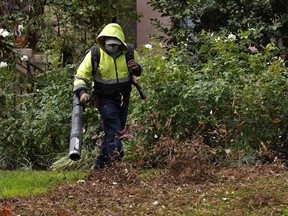
Article content
Re: Emission-spewing gas lawn equipment harmful to health and environment, says Metro Vancouver report, and Metro Vancouver residents must register indoor wood-burning fireplaces, stoves by next year
Advertisement 2
Article content
I am surprised to see rarely used wood-burning fireplaces and stoves vilified as major contributors to poor air quality when leaf blowers are allowed to operate in every neighbourhood at every house, apartment/townhouse complex, city property and schoolyard.
The noise is enough to make any resident (and teacher) grind their teeth in frustration. But it’s the air particulates that the article addresses that should be enough to outlaw this practice. Often, the operators wear ear protection while other people get no relief. Our school is surrounded by three complexes with three different grooming companies blowing for hours on end. Please, Julie Saxton (Metro Vancouver’s program manager for air quality regulation), make it stop.
Article content
Advertisement 3
Article content
Hopefully, my city of Richmond will follow suit.
Renata Hyrman, Richmond
Registration may be the first step toward banning wood burners
Wood burning is an option for many homeowners — usage is increasing due to the war on natural gas. Tax after tax is imposed on our natural gas bills, which after all is a relatively clean burning fuel. Natural gas will still be in use many decades from now.
It seems that Metro wants to identify locations of wood burners so they know where they are when they ban them three to four years from now.
Russell Johnson, Port Coquitlam
Today’s unemployment rates keep labour weak
Re: Inequality has only widened amid Freeland’s obsessive war on wealth
During the Second World War, inflation was held under control despite massive government expenditures, and unemployment fell to one per cent. The highly trained workforce was a major factor in the post-war golden era when transportation, education and health infrastructure were built to be publicly owned and operated at cost, and when comprehensive new social programs were introduced.
Advertisement 4
Article content
Today, unemployment rates of six per cent that keep labour weak are normalized, and private-sector advocates demand low taxes and accelerated depreciation because new infrastructure is to be owned and operated for profit by corporations.
Many Canadians worry about having enough income to pay for food and rent, and having available timely health care. If hard-pressed citizens are to fret about “poor productivity,” then they must be offered more than a slick slogan that a rising tide will raise all our yachts.
Larry Kazdan, Vancouver
Letters to the editor should be sent to provletters@theprovince.com. CLICK HERE to report a typo.
Is there more to this story? We’d like to hear from you about this or any other stories you think we should know about. Email: vantips@postmedia.com
Article content



